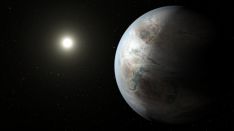 Mesmerized is the best word to describe my state of mind on May 5, 1961, and I was not alone. There were another 44,999,999 other people glued to a black and white TV—all 45 million of us were fixated on NASA’s herculean effort to launch Mercury-Redstone 3 into space, and the heroic exploits of Alan Shepard, Jr.
Mesmerized is the best word to describe my state of mind on May 5, 1961, and I was not alone. There were another 44,999,999 other people glued to a black and white TV—all 45 million of us were fixated on NASA’s herculean effort to launch Mercury-Redstone 3 into space, and the heroic exploits of Alan Shepard, Jr.
Today, nearly 56 years, NASA will be holding a press conference to release information on a new discovery. The space agency will share information concerning their “new findings on planets that orbit stars other than our sun, known as exoplanets.” 
The word I find interesting in the paragraph above is “discovery.” NASA has not created these exoplanets, they have discovered them; and this is true of all truth and scientific findings—they are discovered and not created.
The nature of truth is a frequent topic of discussion in the writings of Norman Geisler and Frank Turek:
- Truth is discovered, not invented. It exists independent of anyone’s knowledge of it. (Gravity existed prior to Newton.)
- Truth is transcultural; if something is true, it is true for all people, in all places, at all times. (2+2=4 for everyone, everywhere, at every time.)
- Truth is unchanging even though our beliefs about truth change. (When we began to believe the earth was round instead of flat, the truth about the earth didn’t change, only our belief about the earth changed.)
- Beliefs cannot change a fact, no matter how sincerely they are held. (Someone can sincerely believe the world is flat, but that only makes the person sincerely mistaken.)
- Truth is not affected by the attitude on the one professing it. (An arrogant person does not make the truth he professes false. A humble person does not make the error he professes true.)
It was Jesus who said: “You shall know the truth and the truth will set you free.” Truth, according to Jesus, can be known; however, the fly in truth’s ointment is that people give little effort to knowing the truth, but they are fully engaged in the pursuit of happiness.
This cart before the horse perspective will only lead to the mire and the muck of Pilgrim’s slough of despond—the more one struggles to find happiness apart from God the more he is stuck in the mud.
I’ll close with this comment by Timothy Keller: “While other worldviews lead us to sit in the midst of life’s joys, foreseeing the coming sorrows, Christianity empowers its people to sit in the midst of this world’s sorrows, tasting the coming joy.”
Think about this truth; it just might set you free.